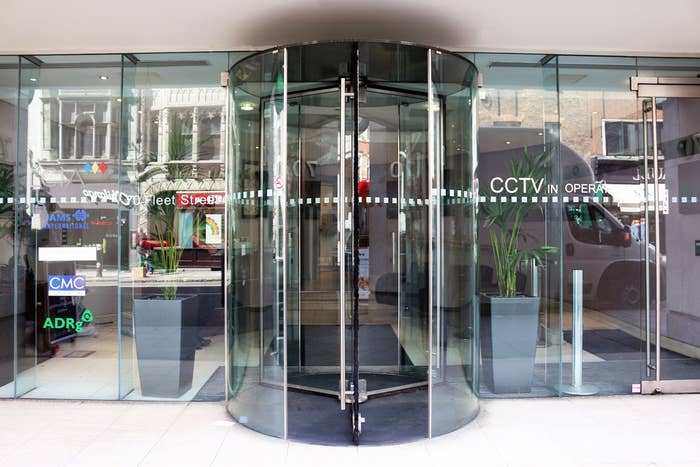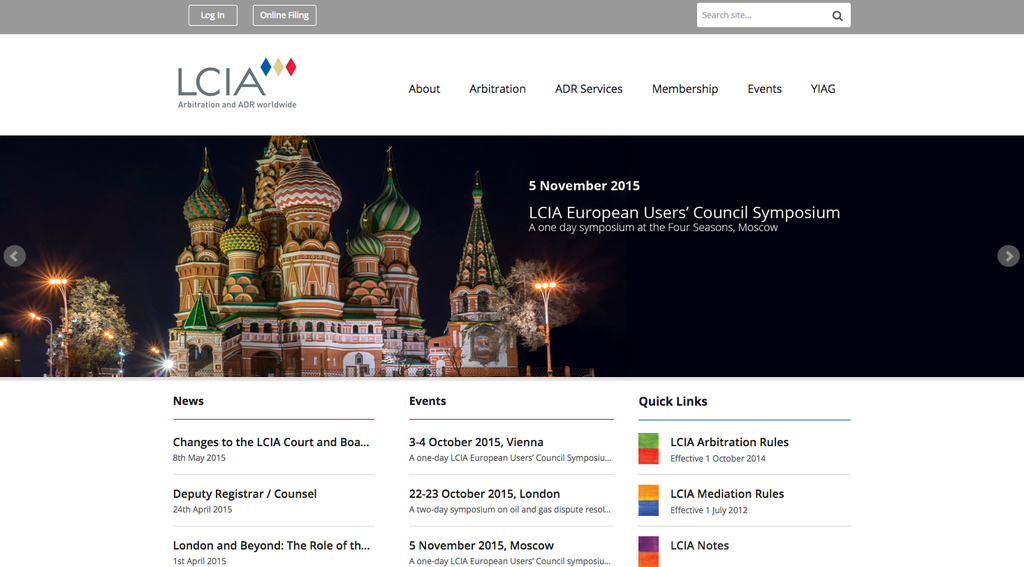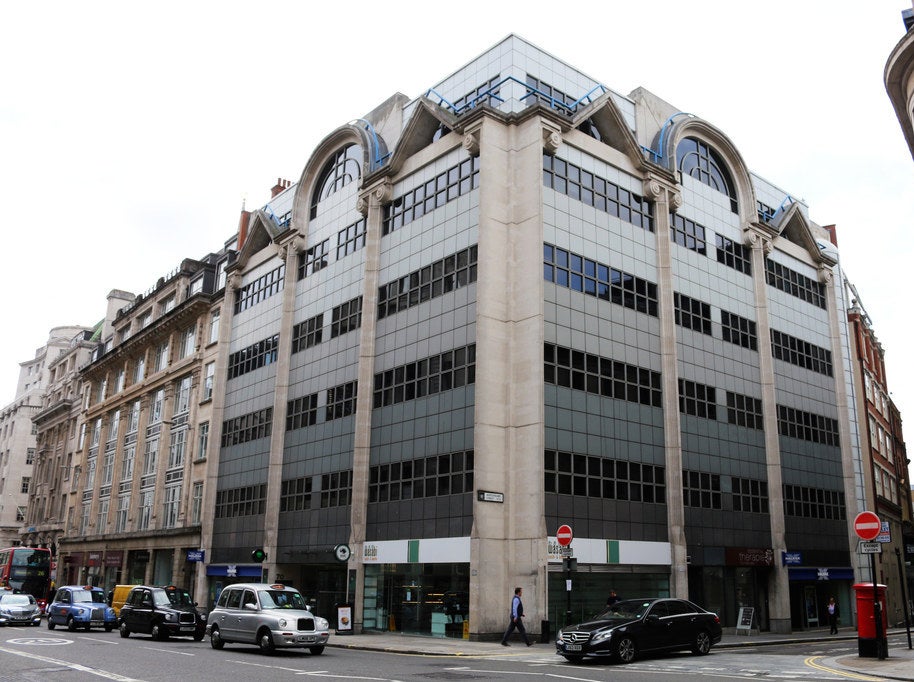
In August 2014, a court forced the UK government to pay more than £224 million in compensation to the manufacturer of an IT system intended to monitor Britain's borders that, ministers said, simply didn't work.
In July 2014, the same court made the government pay more than £700 million to the firm behind another IT system, this time for the NHS – even though it, too, was a "costly failure".
The twist is that the organisation that made the ruling isn't actually a court at all – nor are its decisions made public. It's a low-profile, privately owned body, set up by the City of London, whose rulings are made in secret. It already has extraordinary sway over how the government conducts its business. And soon, it could have a great deal more.

The London Court of International Arbitration (LCIA) sits in an anonymous-looking office in Fleet Street, London.
It is not part of Britain's legal system: a Q&A on its website confirms that "there is no connection between the LCIA and any state court". Instead, the LCIA is "independent", meaning it is run by the City lawyers who act as its judges.
The LCIA was set up by the City of London because, according to its own history, "commercial interests" wanted business disputes settled "by their own". Unlike normal law courts, it works in secret, claiming confidentiality is more important than transparency. As its website says, "nobody who is not a proper party to an arbitration... may obtain information about pending or completed arbitrations from the LCIA".
Yet the LCIA does not just rule on disputes between private companies.
When government departments hire private companies, they generally use a "model contract" drawn up by the Cabinet Office, whose mission statement is to ensure "the effective running of government". This contract, BuzzFeed News can reveal, contains a clause saying that in the event of a disagreement, the two parties will go to the LCIA instead of the regular courts.
After months of inquiries, the Cabinet Office admitted to BuzzFeed News that it did not know when this clause first appeared in such contracts, but said it dated back at least as far as the business-friendly reforms made by Tony Blair's government in 2000.

The consequences of this approach have been dramatic.
In 2007, the Home Office hired the US tech and weapons giant Raytheon to make an electronic border system called "e-Borders", monitoring movement in and out of the UK. In 2010 the Home Office sacked Raytheon. Ministers said that "key milestones had been missed and parts of the programme were running at least a year late". They found Raytheon's work "extremely disappointing" and had "no confidence" in the firm.
Raytheon countered that the Home Office was to blame for delays and claimed it had "delivered substantial capabilities". In August 2014, the LCIA backed its claim, ruling that the firm should get more than £224 million for the breach of its contract.
Normally, the LCIA's judgments are completely secret. But Theresa May's Home Office actually challenged the Raytheon ruling – and won. In a highly unusual, difficult and expensive move, May had the award to Raytheon "set aside" by the High Court.
In hearings in December 2014 and January 2015, Mr Justice Akenhead said there was "serious irregularity " in how the LCIA judged Raytheon's claim, leading to "substantial injustice". He cancelled the compensation, ordering a new hearing by a different tribunal.
Raytheon said it would appeal, arguing that it is "a fundamental principle of international business that awards of arbitral tribunals are respected and enforced by national courts": in other words, Raytheon argued that the British courts should not question the LCIA's judgments.
Rather than face an appeal or a new tribunal, May agreed a £150 million settlement on 27 March. Her actions exposed the LCIA's shortcomings and saved roughly £75 million, but still resulted in a big loss for the taxpayer.

BuzzFeed News can also reveal that another, much bigger award to a corporation for a failed public sector contract was overseen by the LCIA, without being challenged.
It relates to the National Programme for Information Technology (NPfIT), a huge scheme launched in 2003 to create electronic patient records that could be transferred between NHS hospitals, GPs and private health contractors. It launched with a budget of £6.2 billion; by the time the plug was pulled in 2011, it had turned into a £12.7 billion catastrophe.
Fujitsu was one of the main private contractors running the programme, digitising patient records in the South East. According to the National Audit Office, by 2008, only nine of 41 acute hospitals were running the IT systems Fujitsu was meant to have installed – and it wasn't even working properly in those.
That year, the Department of Health sacked Fujitsu from the scheme. Fujitsu said it would fight the decision, and won an arbitration ruling giving it more than £700 million – almost all of the £896 million Fujitsu would have been paid if its part of the contract had been completed.
Yet exactly how, why or when the ruling was made is clouded in secrecy. The Cabinet Office told BuzzFeed News that "protocol is that we don't comment at all". Fujitsu also would not talk about LCIA's role. Its spokesperson said: "We do not comment on our contracts with government."
The only confirmation that BuzzFeed News could find that the case was even heard by the LCIA comes from the online CV of a lawyer at the City firm DLA Piper that includes "Acting on behalf of a UK public authority in a £750 million dispute involving the provision of a defective IT system for public service use in the UK. Advising the client in relation to an LCIA arbitration seated in London." Again, DLA Piper would not respond to any requests for comment.
The LCIA's president, an American called William W Park, has admitted that such secrecy can be a problem.
Writing in an academic publication in 2013, he said: "The right way to do things from the arbitrator's perspective may be the wrong way to do things from the viewpoint of the society at large." He added: "The general community often has a stake not only in the outcome of arbitration, but also in the way proceedings have been conducted." Park said there is usually an "accommodation" where "sanitised versions" of such cases do become public .
However, when BuzzFeed News approached the LCIA for details of the Fujitsu case, it did not offer any "accommodation". Instead it said: "Please be informed that the LCIA does not give any information about individual cases." It also refused to answer any questions about the LCIA itself; its relation to City law firms, or any other matter. Like Fight Club, the first rule of the LCIA is that nobody talks about the LCIA.


This position may not be sustainable, however – because the LCIA is set for a huge expansion of its powers, which could encompass much of the NHS budget.
America and the European Union are currently negotiating the "Transatlantic Trade and Investment Partnership" (TTIP) – a massive transatlantic free trade treaty. The negotiations are being carried out in secret, but the EU admit that TTIP includes clauses on "Investor-State Dispute Settlement" (ISDS) which will allow corporations to sue governments if they feel cheated in public service deals.
Under the treaty, these "investor-state" disputes will be heard by "arbitrators" including the LCIA instead of normal courts. Campaigners such as War on Want claim that such provisions will be used to push the privatisation of public services, especially the NHS: Corporations will be able to sue under "ISDS" for the right to bid to run services formerly carried out by public sector organisations such as the NHS or schools. Such claims would be decided by arbitrators like the LCIA.
The government's position on giving power to the LCIA looks contradictory. On the one hand, Theresa May led one of the only public challenges to an LCIA ruling in the Raytheon case, a challenge that uncovered "serious injustice" in its secretive workings. On the other hand, the Cabinet Office says it has "no plans" to change the clause in its "model contract" that gives the LCIA power over existing public contracts.
David Cameron has also promised to put "rocket boosters" under efforts to sign the TTIP trade treaty: While the German and French governments have expressed concern over the power the "ISDS" clause will give to LCIA and other arbitrators in the treaty, last November Cameron said objectors just "want to spread some fear about this thing".
Last September his business minister, Matthew Hancock said the ISDS clause was needed to "provide an independent process for foreign investors to seek compensation where they believe they have suffered a loss as a result of action by the host state" – even though his own "host state" has lost almost a billion pounds thanks to the same independent process.
Whatever happens, demands for the LCIA to come into the open are only set to increase.
